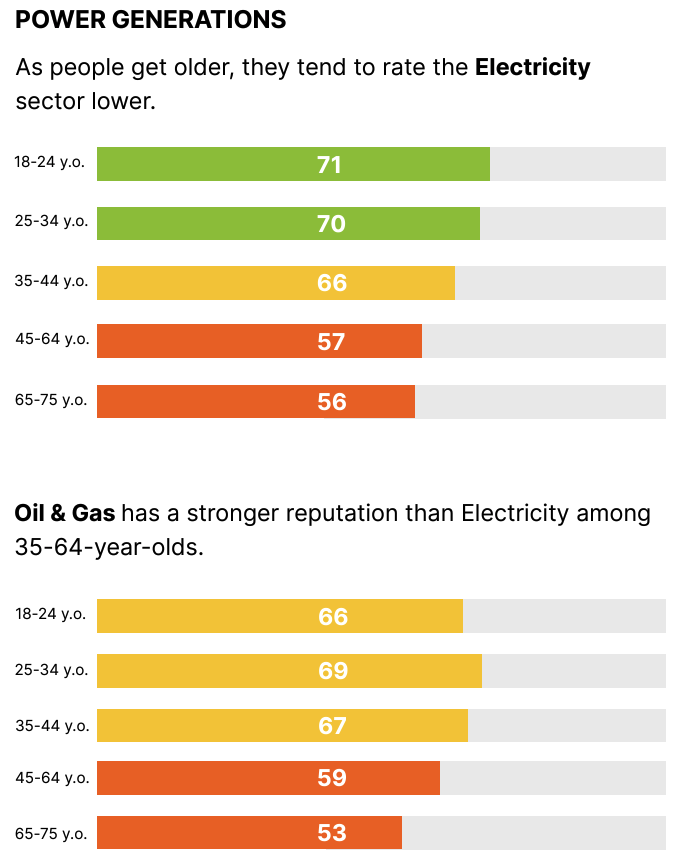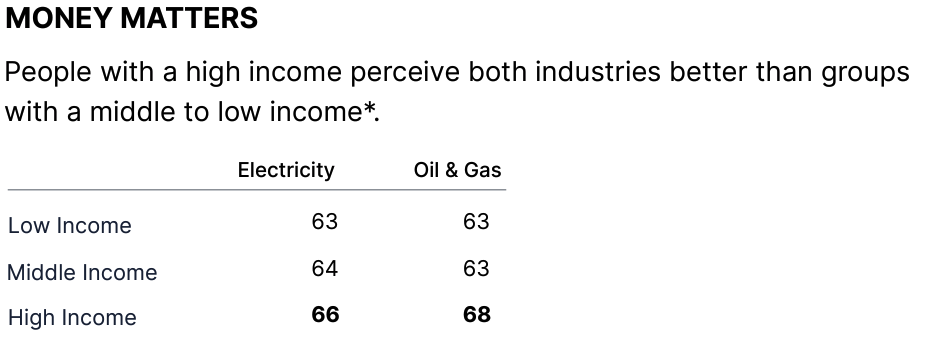

At first glance, our 2023 report on the reputation of the energy industry appears to show no change in its standing since the global energy crisis began two years ago.
In fact, the industry’s two biggest sub-sectors, Electricity and Oil & Gas, both got the same Trust & Like Score – our chief metric for measuring the strength of an industry’s reputation.

But that only tells half the story.
For one thing, younger people have a more favorable perception of the two sub-sectors than older people do.
In other words, the older you get, the less favorable your view of either Electricity or Oil & Gas companies.
For the most part, Electricity is also perceived more favorably than Oil & Gas.
People aged 18-24 – aka Zoomers – gave Electricity companies a mean Trust & Like Score of 71 and Oil & Gas a mean TLS of 66.
Ditto for 25-34-year-olds and 65-75-year-olds, with the latter group – aka Baby Boomers – giving Electricity a TLS three points higher than Oil & Gas.

And then there’s the generation in-between – the 35-64-year-olds, aka the middle-aged and those fast-approaching that much-mocked period of supposed crisis and ennui.
Call them what you want – when it comes to their perceptions of the energy sector, they’ve certainly flipped the script on the other generations.
You see, Oil & Gas companies have a marginally stronger reputation among 35-64-year-olds than Electricity companies do.
One possible explanation?
Unlike Boomers and Zoomers, people in or approaching middle-age are more likely to live with young families in larger households – and pay much higher electricity bills.
Put another way, the 18-24-year-olds cohort includes plenty of students and young adults who still live with their parents and don’t contribute to the household energy bill.
And the 65-75-year-old cohort essentially comprises retirees whose grown-up children have long since flown the nest.

Our report contains other evidence that many people are concerned by energy bills.
For one thing, people with a high income perceive both Electricity and Oil & Gas companies better than those with a middle or low income. Might this be because their stronger financial position better insulates them from skyrocketing energy bills?
We also asked survey respondents which three words come to mind when they think of the energy industry.
The top answer for every age group? Expensive.
Every age group, that is, except for 18-24-year-olds – who cited “oil” and “new” above “expensive”. Might this be because many Zoomers still live at home and pay scant attention to their parents’ electricity bill?
If so, it may also explain why just 29% of Zoomers said keeping prices low should be a priority for energy companies, compared to 39% of 35-44-year-olds and 47% of 45-64-year-olds.
Taken together, what does all this mean for energy companies?
First, that they should tailor their communications to different audiences more than ever.
Different generations clearly have different expectations for energy companies, from wanting them to keep prices low to looking to them to reduce their impact on the planet.
To mitigate negative perceptions, the energy sector must work harder to educate customers and the broader public about what they’re doing to make energy cheaper and cleaner.
Indeed, the global energy crisis turned up the heat on energy companies, accentuating their role in both the climate crisis and geopolitics, and showing the sector’s sensitivity to inflationary pressures.
We think energy companies need to assume more responsibility for their impact on society – and show people what they’re doing to meet their expectations.
© 2024 Group Caliber | All Rights Reserved | VAT: DK39314320